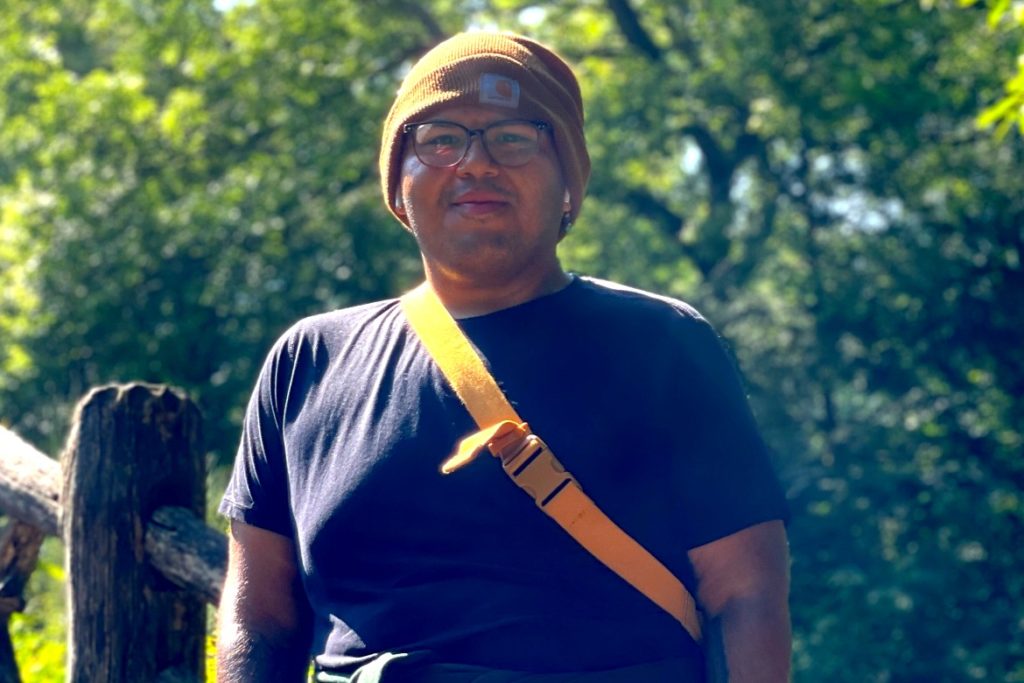Ruby Mendoza, a Ph.D. candidate in the Department of Writing, Rhetoric, and American Cultures at Michigan State University, has won a national award in recognition of their outstanding work in the area of queer theory.
Mendoza is one of only two recipients of the 2023 Gloria Anzaldúa Rhetorician Award, a national scholarship presented by the Conference on College Composition and Communication (CCCC) to support scholars whose work participates in the making of meaning out of sexual and gender minority experiences.

“I focus on research about the idea of amplification and liberation for BIPOC (Black, Indigenous, and People Of Color) communities, through intersectional queer, transgender, and feminist resistant practices,” Mendoza said. “My objective as a researcher is to produce work that is not just life-affirming but life-saving for communities that are impacted by institutionalized systems of oppression.”
Gloria Anzaldúa was a Chicana scholar and leader in queer theory and identity. In honor of her work, which has had a profound impact on the studies of both rhetoric and queer theory, this award in her name celebrates work that connects and forges new conversations at the nexus of queer theory, sexual and gender minority experiences, and writing and rhetoric studies.
“All my work is about shedding light on systematic issues,” Mendoza said, “but also finding some sort of healing from that so we can move on — not holding on to trauma so as to be more productive in the next stages of life.”
“My objective as a researcher is to produce work that is not just life-affirming but life-saving for communities that are impacted by institutionalized systems of oppression.”
Originally from California, Mendoza is a third-year doctoral student whose research interests include Medical, Queer, and Transgender Rhetorics; User Experience Design, Strategy, and Methods; and Social Justice.
“I come from a very poor background — I dealt with homelessness and those kinds of things, so I went into education, not for money, but to better my life in a way that I could actually support communities in need,” Mendoza said. “I’m grateful for my department and the college; they have supported me and allowed me to have creative control.”
Mendoza has an M.A. in Rhetoric and Writing Studies from San Diego State University and a B.A. in English Studies from California State University, Chico. One of Mendoza’s professors at California State University, Chico — Kendall Leon, who was an Associate Professor of English and Composition Coordinator — received her Ph.D. in Rhetoric and Writing from Michigan State University and inspired Mendoza to attend MSU.

“Going from a Hispanic-serving institution to a predominantly white institution really motivated my work to think about how we can create spaces to support students of color who are impacted by these types of spaces,” Mendoza said. “It’s thinking about how to create institutional change and support people like me and how my work can really contribute to justice-oriented approaches. I have to talk about my lived experiences to make sense of how MSU has really helped with the trajectory of my work.”
For Mendoza, writing has always been a significant outlet.
“When I think about writing, it’s always about doing things for others. Sometimes that means positioning myself through stories to talk about lived experiences that have impacted me,” Mendoza said. “There’s systematic oppression that impacts our material, social, economic, and political ways of living. My work attends to those issues. From that, it becomes a process towards healing.”
Applicants of the Gloria Anzaldúa Rhetorician Award were judged on originality of research, critical engagement with and contribution to current scholarship in queer studies and rhetoric/composition, and potential for lasting projects. Winners were honored at the 2023 CCCC Annual Convention held in February in Chicago, where Mendoza was a member of two panels.
“There’s systematic oppression that impacts our material, social, economic, and political ways of living. My work attends to those issues. From that, it becomes a process towards healing.”
The first panel discussed how queer and transgender rhetorics need to move forward as a field and the second focused on individual dissertation projects.
As part of Mendoza’s dissertation, Mendoza includes their own experiences in institutional disruption.
“As someone who’s queer, trans, and part of the Black, Indigenous, People of Color community — even though that acronym, BIPOC, is kind of problematic — for my dissertation, I interviewed six working professionals in the field who have done this work and who have navigated these systems,” Mendoza said. “I interviewed participants to understand some of the things they’ve gone through and how it’s impacted them. Just thinking comprehensively about how to move forward. I conclude with my own story of dealing with institutional passion in those three areas.”
CCCC is a constituent organization within the National Council of Teachers of English (NCTE). As a recipient of the Gloria Anzaldúa Rhetorician Award, Mendoza received $750 to travel to the CCCC Annual Conference where a reception was held to honor the Gloria Anzaldúa Rhetorician Award winners. Mendoza also received a one-year membership in NCTE and CCCC.
“As I move forward, I think about moving institutional support, not just within higher education, but actual communities that are impacted by institutions,” Mendoza said. “My mission and goal are to then move into the community and support them and actually provide ways, grants, and monetary support to help folks to build research on that.”


